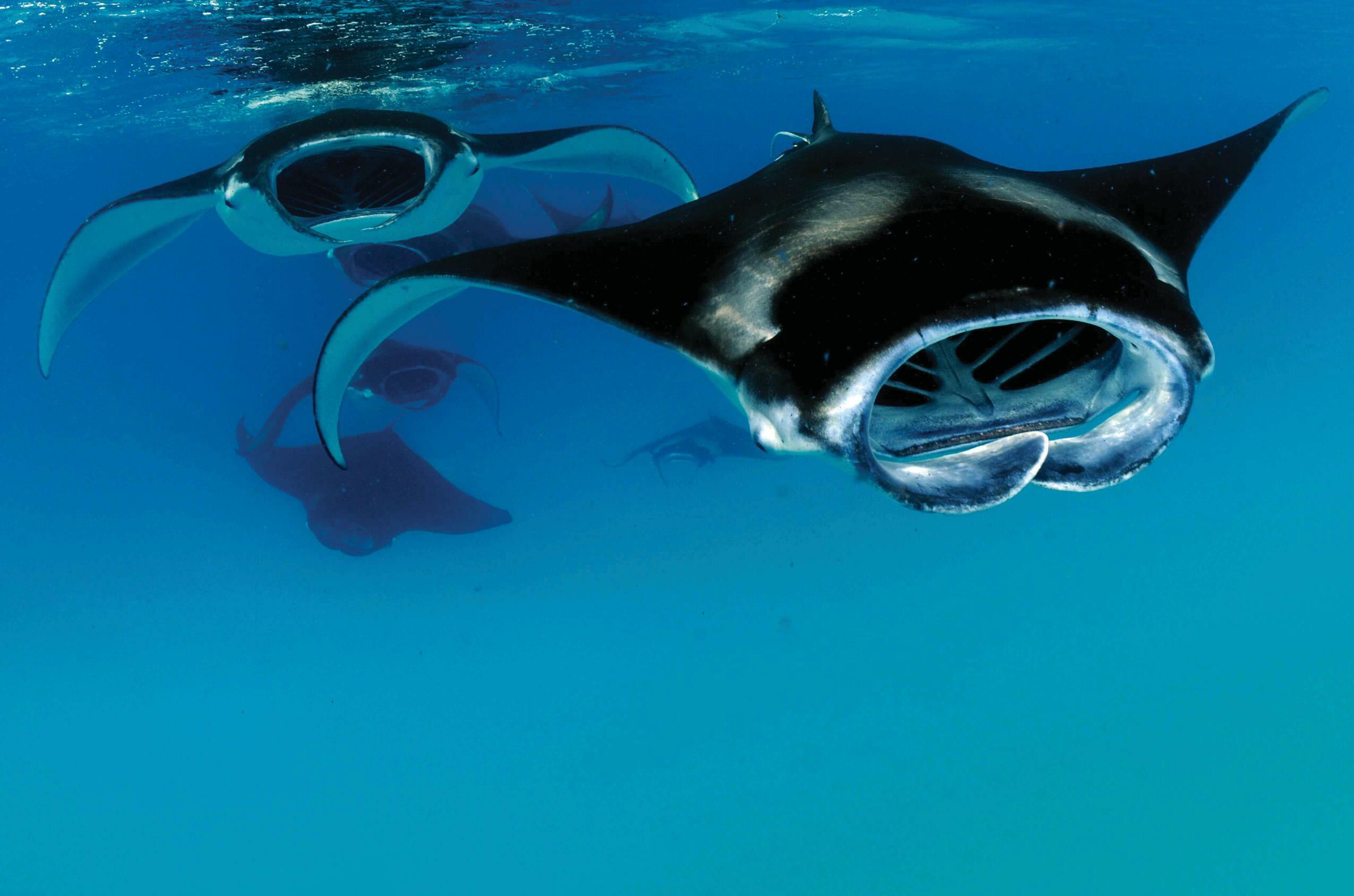
IN THE GLASS-CLEAR WATERS OFF THE MALDIVES' Raa Atoll, something akin to an underwater circus is taking place. The manta rays that have gathered near our boat streak through the water, unfurling their wings as they perform barrel rolls, somersaults and sudden dives. They disappear into the depths before magically reappearing, mouths agape and cephalic fins (horn-like structures used for feeding) curled as they gulp down tiny plankton invisible to the naked eye.
Watching marine biologist Jess Haines in action is no less impressive - even more so given she hasn't been blessed with the ability to breathe underwater. Jess trails the manta rays as they perform their acrobatics, snapping pictures of their undersides.
Manta ray bellies, known as 'ventral surfaces', each bear a unique pattern of spots that act much like a human fingerprint. In the absence of tags, which are banned in the Maldives, photos enable scientists to identify every individual and thus monitor movements, population dynamics and feeding and breeding hotspots. Given that manta rays are now listed as Threatened by the IUCN, with populations increasingly affected by over fishing and by catch, this is vital research.
Jess's love affair with mantas began after she completed her zoology degree. Arriving in the Maldives in 2017 to work as a marine biologist and dive instructor on Dhaalu Atoll, she saw - and fell in love with - reef manta rays, the smaller of the two manta species. She started sending photos of individuals she encountered to the Manta Trust, a conservation organisation founded in 2011, helping to build a database in an area where it had no staff. In 2019, she joined the team as manager of the Maldivian Manta Ray Project. Protecting these spectacular marine creatures was now her day job.
هذه القصة مأخوذة من طبعة July 2023 من BBC Wildlife.
ابدأ النسخة التجريبية المجانية من Magzter GOLD لمدة 7 أيام للوصول إلى آلاف القصص المتميزة المنسقة وأكثر من 9,000 مجلة وصحيفة.
بالفعل مشترك ? تسجيل الدخول
هذه القصة مأخوذة من طبعة July 2023 من BBC Wildlife.
ابدأ النسخة التجريبية المجانية من Magzter GOLD لمدة 7 أيام للوصول إلى آلاف القصص المتميزة المنسقة وأكثر من 9,000 مجلة وصحيفة.
بالفعل مشترك? تسجيل الدخول

SNAP-CHAT
Justin Gilligan on giant spider crabs and holding hands with an octopus

STEPPE CHANGE
Herds of saiga have returned to Kazakhstan, but there's a fine balance to tread

TREES FOR LIFE
Community is at the heart of conservation in the tropical forests of southern Belize

WHEN DOVES CRY
Turtle doves are now the UK's fastest declining bird species, but the RSPB is on a mission to save them

SURVIVAL OF THE CUTEST
We can't help being drawn to cute creatures, but our aesthetic preferences both help and hinder conservation

LIGHT ON THE NORTH
Spectacular images of Arctic foxes, reindeer and musk oxen reveal the wild beauty and diversity of Scandinavia

ROLLING IN THE DEEP
The super-sized crustacean that lives in the deepest, darkest ocean

LET'S GET TOGETHER
Clay licks deep in the Amazon explode in a riot of colour, with macaws the stars of the show

FEMALE OF THE SPECIES
To sponge or not to sponge? That is the question for the bottlenose dolphins (Tursiops aduncus) living in Shark Bay, Western Australia.

7 nature encounters for the month ahead
WITH NATURALIST AND AUTHOR BEN HOARE